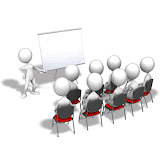End of Fall Teaching Term
Monday night I gave my final lecture of the term to my large Intro to Political Theory course (300 students). As I was reflecting on the course content, and explaining to my students why I am so passionate about teaching the history of political thought to the majors in our program (we have 2 mandatory theory courses on the history of political thought, and I teach both those courses), I thought I would post some of those reflections/comments here.
Before we act, as both individuals and collectively as societies, we think. We form assumptions (e.g. about human nature, about "cause and effect", about the scope and limits of government power), we form aspirations (e.g. about equality, freedom, justice, etc.), and we deliberate about the pros and cons of different courses of action. These cognitive processes and deliberations ought to be the subject of intense study and scrutiny. We are much more likely to make better decisions (as individuals and collectivities) when sound assumptions, aspirations, and deliberations precede our acting. The ideas of past thinkers constitute an experimental laboratory of diagnosing societal predicaments and offering political aspirations and prescriptions to meet the perceived challenges of human societies. By examining and engaging with these thinkers we expand our own cognitive toolbox, helping us avoid the mistakes of the past, appreciating the depth of insights and wisdom of past thinkers, and inspiring us to continue the project of striving for a better future.
Because I teach two large mandatory undergraduate courses on the history of political thought many students form the mistaken impression that most of my research involves the past. But most of my research involves addressing the challenges of the future, especially advances in biomedical research and the determinates of well-ordered science in an aging world. But I pre-commit myself, as a scholar and teacher, to always ensure my intellectual development is anchored to an appreciation for the canon of the tradition, to ensure I am always learning lessons from the past when thinking about the future.
It is so easy for an academic to be distracted by what happens to be trendy today, or consumed by the issues/concerns of those constantly posting on social media, etc. As an scholar I consciously work at keeping my research interests and intellectual development framed in "the big picture" of humanity's plight over centuries/millennia vs what happens to make the news in 2023. Such perspective taking" ensures our intellectual development is not overly fixated on "the immediate". Perhaps the things we happen to be fixated upon today arise because we are asking the wrong questions, or have a constrained understanding of the potential "menu of options". "Outside the box" thinking can be facilitated by transcending our geography and time, something that is encouraged and developed by engaging with the ideas and aspirations of thinkers that came before us and tackled the perceived problems of their day.
I finished my lecture last night by telling my students that the responsibility of scrutinizing and refining our political ideas and ideals is now the task for their generation to take on. I hope that, through my course, they have developed an appreciate for how those that lived before them have tried to theorize about the challenges of their day- be it the potential conflict between democracy and justice (Plato), the aspirations of civil disobedience (MLK, Jr.), human nature and the state (Hobbes), limited government and property (Locke), anarchism (Kropotkin, Goldman) or criticisms of the social contract (e.g. Pateman and Mills).
Cheers,
Colin



<< Home